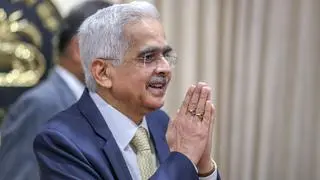The Finance Ministry's directive to all public sector banks (PSBs) to organise a special credit campaign to give loans to all eligible borrowers in rural areas in the fortnight beginning December 1 has not gone down well with key stakeholders in the banking system.
Bankers and trade union representatives say the Ministry's rapid action plan asking PSBs to extend credit facilities to all eligible agricultural and non-agricultural borrowers — by issuing Kisan Credit Card (to farmers) and General-purpose Credit Card (to non-farmers) — in rural areas in 15 days flat was a major challenge.
The target set by North Block for the 26 PSBs (including five associate banks of State Bank of India) was daunting given that even after 42 years of bank nationalisation just about 40 per cent of the country's citizens have banking facilities.
According to a senior public sector bank official, “Banks are doing their utmost to push the Government's financial inclusion programme to ensure that the 72,950 identified un-banked villages (with population of over 2,000) have banking facilities by March 2012.
Declined loans
“The fact that we are already stretched in rural areas when it comes to manpower has not been appreciated by the authorities….We have come across many cases where eligible villagers declined our loan offer stating that they will come back when they need it.”
State Government agencies, such as the Revenue Department, which were supposed to act in tandem with banks to vouch for the eligibility of potential borrowers did not do their part in the special credit campaign, said another banker. Possibly, the Government has issued the aforementioned directive to sensitise the rural population that they can approach PSBs in future for their credit needs, he surmised.
Dearth of Staff
Pointing out that PSBs are reeling under manpower shortage, Mr G. D. Nadaf, General Secretary, All-India Bank Officers' Confederation, said thrusting more work on rural branches when many of them have only one officer for every branch and burdening them with unrealistic credit targets could lead to procedural lapses and irregularities. This will have consequences for officers.
“We are all for financial inclusion. But in the case of the special credit campaign we strongly feel that under pressure, false certificates may have been submitted by branches regarding completion of targets. The real purpose of the campaign is lost,” explained Mr Nadaf.
Though increasing priority sector lending — agriculture, micro and small enterprises, artisans, and so on — was the need of the hour, Mr Vishwas Utagi, General Secretary, Maharashtra State Bank Employees Federation, said there are concerns that local politicians would have exploited bankers' anxiety to fulfil the targets due to the administrative fiat. The end result is that banks end up with bad loans on their books.
Planning needed
“Such credit campaigns cannot be ad-hoc one-time engagements. They have to be planned and sustained over a period of time,” he said.
Under Kisan Credit Card, owner cultivators, tenant cultivators and share croppers are provided credit to meet their production credit needs, besides meeting contingency expenses, and expenses related to ancillary activities. Normally, banks extend 100 per cent of the cultivation cost as loan up to Rs 50,000 and 85 per cent of the cost as loan above Rs 50,000.
Under General-purpose Credit Card, banks' customers are provided hassle-free credit based on their cash flow without insistence on security, purpose or end-use of the credit. The maximum loan amount that can be taken is Rs 25,000.






Comments
Comments have to be in English, and in full sentences. They cannot be abusive or personal. Please abide by our community guidelines for posting your comments.
We have migrated to a new commenting platform. If you are already a registered user of TheHindu Businessline and logged in, you may continue to engage with our articles. If you do not have an account please register and login to post comments. Users can access their older comments by logging into their accounts on Vuukle.